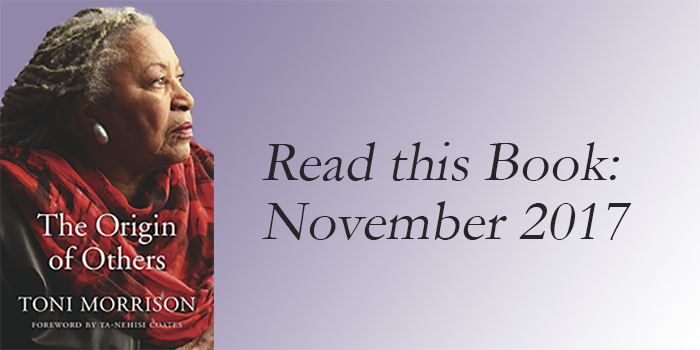The question of the “other” is a recurring one. Many scholarly volumes wrestle with this inquiry: who is the other? Toni Morrison enters the discourse with a decidedly reflective view of her own work alongside a plethora of writers who have produced both fictional and scholarly, literary and scientific contributions. Morrison’s particular reference to “origin” is a play on the folksy notion of creation as she weaves her literary prowess into the fabric of despair for those “othered,” while concomitantly leveling seismic critique upon those whose literal and figurative expressions serve to “other” human beings, historically and presently.
This volume is a rare glimpse into the author’s corpus of meaning, guided by the author herself. I say rare because seldom does one have the benefit of knowing, with direct evidence, an author’s intention in literary prose. Here, Morrison painstakingly ventures toward explaining her literary genius in three principle works: Beloved, Paradise, and A Mercy, though mention is made of several others. Morrison’s aim is to uncover for the reader her attention to the ways people have been “othered” in literary works. Morrison poses the question “what is the nature of Othering’s comfort, its allure, its power (social, psychological, or economical)? Is it the thrill of belonging – which implies being part of something bigger than one’s solo self, and therefore stronger?” She concludes that the “need for a ‘stranger,’ as an Other” is emblematic of the need for validation of self. Moreover, she demonstrates the syncretic nature of imaginary characters to real characters when the treatment in fictional accounts of real occurrences mirror that of lived experience. Morrison establishes the nexus that literary works bring to the theoretical realm.
Beginning her reflection with Harriet Beecher Stowe, Morrison recounts the many instances in Stowe’s seminal work, Uncle Tom’s Cabin, where “slavery is sexually and romantically sanitized and perfumed.” (14) In so doing, the writer treats the subject as a distant other with less than human attributes when in fact, the many instances of rape upon the bodies of enslaved women had very tangible consequences, social, psychological, spiritual and physical, for the victims whose humanness was incessantly disregarded. Morrison next explores the ways in which the “stranger” is the other and drawing specifically from the biblical text (Exodus 22:21) she references the repudiation of the text’s intent by Flannery O’Connor in the short story, “The Artificial Nigger,” where Nelson, the young nephew of the character Mr. Head is instructed in the art of othering. Asked ‘what was that’ Nelson replies, ‘a man.’ His uncle then asks ‘what kind of man is that,’ referring to a black man they see on a train, Nelson answers his uncle ‘a fat man,’ and after several benign referents, the uncle retorts ‘that was a nigger.’ (22) Demonstrating how the other is deployed to separate and define simultaneously, Morrison concludes that the characters’ sense of belonging is inextricably bound to the “fear of not belonging, of becoming, themselves, the stranger.” (23)
The monograph makes an important contribution to the discourse on inter-subjectivity in which the metaphysical, consistent with Levinasian thought, precedes the ontological. Morrison’s treatment of Margaret Garner, a black woman, whose enslaved experience was so horrendous that she took the life of her children to spare them the degradation of what she had endured, is a case in point. Morrison’s account of this story, the impetus for her novel, Beloved, brings to mind the lyrics of James Weldon Johnson’s phrase “when hope unborn had died,” in the song Lift Every Voice and Sing. Hope, after being conceived, but having no chance of being birthed, dies in the womb of knowledge because the realities that the subject endures aborts the thought that life has hope. Reminiscent of the Derridian treatment of biblical Abraham and his son Isaac, Garner had no ram in the bush, and therefore, killed her children thereby leading Morrison to query why? Morrison states “Wondering what her answer might finally be, I decided that the only one with the unquestionable right to judge was the dead child herself, whom I named the one word her mother could have afforded to have inscribed on her tombstone, Beloved.” (82)
This book offers a fresh reading of familiar literary works for the present moment. As we navigate the political climate that gives rise to neo-Nazis and white supremacists visiting our neighborhoods seeking to “other” those of us who do not “belong,” Morrison offers The Origin of Others as a contribution to the growing investigation of how human beings treat and mistreat each other. I recommend this work as a resource for literary methodology and as a primer for literary criticism.
Periodically, we ask a member of the Vanderbilt Divinity School faculty and staff to recommend a book they are currently reading. Our November recommendation is offered by the associate director of the Public Theology and Racial Justice Collaborative, Teresa Smallwood JD, PhD. Dr. Smallwood recommends Toni Morrison’s The Origin of Others (Cambridge: Harvard University Press, 2017).
